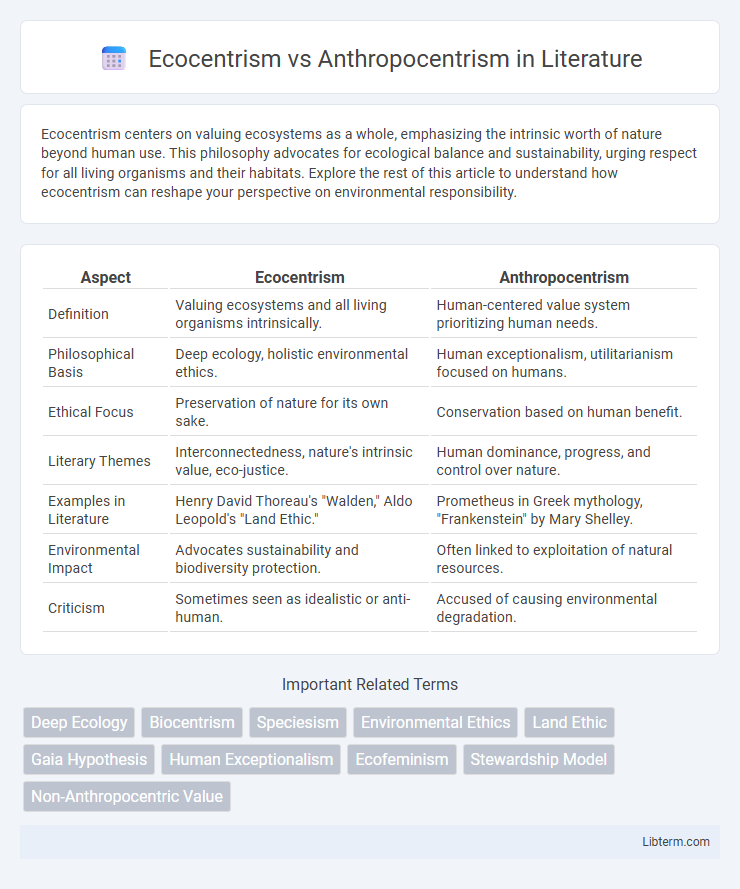Ecocentrism centers on valuing ecosystems as a whole, emphasizing the intrinsic worth of nature beyond human use. This philosophy advocates for ecological balance and sustainability, urging respect for all living organisms and their habitats. Explore the rest of this article to understand how ecocentrism can reshape your perspective on environmental responsibility.
Table of Comparison
| Aspect | Ecocentrism | Anthropocentrism |
|---|---|---|
| Definition | Valuing ecosystems and all living organisms intrinsically. | Human-centered value system prioritizing human needs. |
| Philosophical Basis | Deep ecology, holistic environmental ethics. | Human exceptionalism, utilitarianism focused on humans. |
| Ethical Focus | Preservation of nature for its own sake. | Conservation based on human benefit. |
| Literary Themes | Interconnectedness, nature's intrinsic value, eco-justice. | Human dominance, progress, and control over nature. |
| Examples in Literature | Henry David Thoreau's "Walden," Aldo Leopold's "Land Ethic." | Prometheus in Greek mythology, "Frankenstein" by Mary Shelley. |
| Environmental Impact | Advocates sustainability and biodiversity protection. | Often linked to exploitation of natural resources. |
| Criticism | Sometimes seen as idealistic or anti-human. | Accused of causing environmental degradation. |
Introduction to Ecocentrism and Anthropocentrism
Ecocentrism emphasizes the intrinsic value of all ecosystems and living organisms, advocating for environmental protection independent of human benefit. Anthropocentrism centers human needs and interests, viewing nature primarily as a resource for human use and economic gain. Understanding these contrasting philosophies is essential for developing sustainable environmental policies and ethical frameworks.
Defining Ecocentrism: Nature-Centered Ethics
Ecocentrism is a nature-centered ethical framework prioritizing the intrinsic value of all living organisms and ecosystems beyond human interests. This philosophy emphasizes the interconnectedness of life, advocating for environmental protection that respects the well-being of entire ecological communities. In contrast to anthropocentrism, ecocentrism challenges human-centered morals by promoting sustainability and biodiversity conservation as fundamental ethical imperatives.
Understanding Anthropocentrism: Human-Centered Perspectives
Anthropocentrism places humans at the center of moral consideration, valuing nature primarily for its utility to human well-being and development. This human-centered philosophy influences environmental policies by prioritizing economic growth and resource use over intrinsic ecological balance. Understanding anthropocentrism is essential for addressing conflicts between human interests and environmental sustainability.
Historical Contexts of Environmental Worldviews
Ecocentrism emerged from deep ecology movements in the 1970s, emphasizing the intrinsic value of all living beings and ecosystems, contrasting sharply with anthropocentrism's historical roots in Western industrialization and Enlightenment thought, which prioritize human needs and interests. Anthropocentric worldviews dominated early environmental policies, often leading to resource exploitation under the assumption of human superiority and entitlement. Ecocentrism gained traction during the environmental crises of the late 20th century, advocating for a holistic balance between humans and nature in response to the environmental degradation caused by anthropocentric practices.
Key Philosophical Differences
Ecocentrism prioritizes the intrinsic value of all living organisms and ecosystems, emphasizing the interconnectedness of nature beyond human interests. Anthropocentrism centers human beings as the primary holders of moral consideration, valuing nature mainly for its utility to humanity. The fundamental philosophical difference lies in ecocentrism's holistic approach to environmental ethics versus anthropocentrism's human-centered framework.
Ecocentrism in Environmental Policy and Practice
Ecocentrism in environmental policy emphasizes the intrinsic value of all living organisms and ecosystems, promoting preservation and sustainable management practices that go beyond human interests. This approach supports regulations that prioritize biodiversity conservation, ecosystem health, and long-term environmental resilience, influencing international agreements like the Convention on Biological Diversity. Implementing ecocentric policies leads to integrated land-use planning, strict pollution controls, and restoration projects that aim to maintain the balance of natural systems regardless of immediate economic benefits.
Anthropocentrism in Modern Society
Anthropocentrism in modern society places humans at the center of moral consideration, prioritizing human needs and interests over ecological concerns. This worldview drives economic growth, technological advancement, and resource exploitation, often leading to environmental degradation and biodiversity loss. Critics argue that such a human-centered approach undermines sustainable development and hampers efforts to address climate change effectively.
Environmental Consequences of Both Worldviews
Ecocentrism emphasizes the intrinsic value of all living organisms and ecosystems, leading to environmental policies that prioritize biodiversity conservation and sustainable resource management. Anthropocentrism centers human needs and benefits, often resulting in exploitation of natural resources and significant environmental degradation such as deforestation, pollution, and climate change. The environmental consequences of ecocentrism promote ecosystem resilience and long-term sustainability, whereas anthropocentrism tends to accelerate habitat loss and ecological imbalance.
Balancing Human Needs and Ecosystem Health
Ecocentrism prioritizes the intrinsic value of ecosystems, advocating for the protection and sustainability of natural habitats regardless of human benefit, while anthropocentrism centers on human needs and interests, often justifying environmental use for economic or social gains. Balancing these views requires integrating ecosystem health into human development plans, ensuring resource management practices support biodiversity and long-term environmental resilience. Effective policies incorporate scientific data on ecosystem services, promoting sustainable agriculture, clean water access, and climate mitigation to harmonize human welfare with ecological integrity.
Toward a Sustainable Future: Integrating Both Perspectives
Ecocentrism emphasizes the intrinsic value of all living beings and ecosystems, advocating for environmental protection beyond human benefit, while anthropocentrism centers human needs and interests as primary. Integrating both perspectives fosters sustainable development by balancing human welfare with ecological integrity, ensuring resource use respects planetary boundaries and biodiversity conservation. This synthesis supports environmental policies and practices that promote long-term resilience and equitable outcomes for both nature and society.
Ecocentrism Infographic

 libterm.com
libterm.com